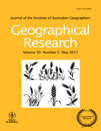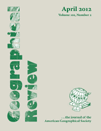
Geographical Research
Scope & Guideline
Exploring the Terrain of Knowledge
Introduction
Aims and Scopes
- Interdisciplinary Research:
The journal promotes research that integrates various disciplines, including sociology, economics, environmental science, and cultural studies, to explore complex geographical issues. - Focus on Climate and Environmental Studies:
A significant portion of the research addresses climate change, its impacts, and resilience strategies, highlighting the journal's commitment to environmental sustainability. - Human Mobility and Migration:
Research on migration patterns, transnationalism, and the socio-economic implications of human mobility is a core area, reflecting contemporary global challenges. - Urban and Regional Studies:
The journal covers urbanization processes, governance, and planning in cities, emphasizing the dynamics of urban spaces and their socio-political contexts. - Indigenous and Decolonial Perspectives:
There is a growing focus on Indigenous rights, biocultural perspectives, and decolonial methodologies, which provide critical insights into geographical research. - Public Health and Geography:
The intersection of health and geography is frequently explored, especially in the context of pandemics, community health, and environmental impacts on well-being.
Trending and Emerging
- Climate Justice and Activism:
There is a rising trend in research that explores climate justice, grassroots activism, and the role of communities in addressing climate change, highlighting the intersection of geography and social equity. - Emotional Geographies:
Increasing attention is being paid to emotional geographies, which examine the affective dimensions of space and place, particularly in relation to experiences of loss, community, and environmental change. - Pandemic Studies:
The COVID-19 pandemic has catalyzed a surge in research addressing its geographical implications, including social isolation, urban governance, and the reconfiguration of public spaces. - Indigenous Knowledge Systems:
There is a noticeable increase in the incorporation of Indigenous perspectives and knowledge systems in geographical research, emphasizing decolonization and cultural rights. - Urban Resilience and Sustainability:
Research focusing on urban resilience strategies in the face of climate change and social challenges is gaining traction, reflecting a broader concern for sustainable urban futures. - Technological Integration in Geography:
Emerging themes around the use of technology, such as GIS and remote sensing, for participatory planning and community engagement are becoming more prominent in recent publications.
Declining or Waning
- Traditional Economic Geography:
There seems to be a waning interest in conventional economic geography topics, such as industrial location theory and traditional economic development models, as researchers shift towards more dynamic and interdisciplinary approaches. - Static Land Use Studies:
Research focused solely on static land use patterns without considering the socio-political or environmental contexts is becoming less common, reflecting a move towards more integrative analyses. - Historical Geographies:
While historical contexts remain important, the specific focus on historical geography as a standalone topic appears to be fading in favor of contemporary and applied geographical studies. - Quantitative Spatial Analysis:
Although quantitative methods are still relevant, there is a noticeable decline in papers that solely rely on traditional quantitative approaches without integrating qualitative insights or mixed methods. - Rural Studies:
Research specifically centered on rural geographies, particularly in developed nations, seems to be diminishing, with a shift towards urban-centric studies reflecting current demographic trends.
Similar Journals

Geographia Polonica
Elevating Geographic Scholarship Since 1972Geographia Polonica is a premier academic journal published by the Polish Academy of Sciences, Institute of Geography and Spatial Organization, renowned for its contributions to the field of geography and related disciplines. With a history spanning from 1972, it has evolved into a vital resource for researchers and professionals, addressing a wide spectrum of topics from cultural studies to urban planning and development. Geographia Polonica is indexed with impressive rankings in various categories, including a Q1 classification in Cultural Studies and significant positions in Earth and Planetary Sciences and Urban Studies, reflecting its influence and recognition in these critical areas. Although it operates under a traditional subscription model, its commitment to high-quality, peer-reviewed research ensures that the latest findings and advancements are accessible to the academic community. With its rich archival content and contemporary insights, Geographia Polonica serves as an essential platform for scholarly dialogue, making it an invaluable reference for students, researchers, and professionals eager to explore the complexities of spatial organization and geographical phenomena in a global context.

GEOGRAPHICAL REVIEW
Pioneering Research in Geography Since 1969GEOGRAPHICAL REVIEW, published by Taylor & Francis Inc, is a premier academic journal recognized for its influential contributions to the fields of geography and earth-surface processes. With an ISSN of 0016-7428 and an E-ISSN of 1931-0846, this journal has established itself as a vital resource for researchers, professionals, and students alike. The journal maintains a strong reputation with a Q1 ranking in both Earth-Surface Processes and Geography, Planning and Development, reflecting its scholarly impact and relevance in the academic community. Additionally, it holds a notable position in Scopus rankings, placing #181 out of 821 in Social Sciences and #45 out of 179 in Earth and Planetary Sciences. Although it is not open access, the GEOGRAPHICAL REVIEW remains essential for those seeking to expand their understanding of spatial analysis and environmental processes from its historical inception in 1969 to its ongoing publications through 2024. Explore rigorous research articles, critical reviews, and innovative studies that shape the discourse in geography and earth sciences today.

CyberGeo-European Journal of Geography
Connecting Scholars Through Open Access GeographyCyberGeo-European Journal of Geography, published by CYBERGEO, is a leading open-access journal that has been at the forefront of geographical research since its inception in 1996. With a dedicated focus on the multifaceted dimensions of geography, the journal aims to disseminate innovative and critical insights into geographical phenomena in Europe and beyond. The journal has established itself in the academic community, currently holding the Q3 quartile ranking in the Social Sciences (miscellaneous) category for 2023 and recognized within Scopus as #428 out of 604, placing it in the 29th percentile. CyberGeo publishes original research articles, thematic issues, and reviews that contribute to the advancement of geographical knowledge, making it an essential resource for researchers, professionals, and students alike. Situated in Paris, France, the journal embraces a truly international perspective and invites contributions that stimulate scholarly debate and further the understanding of spatial dynamics. By providing open access to its content, CyberGeo ensures that its research is accessible to a global audience, promoting knowledge sharing and collaborative exploration in the field of geography.

Hrvatski Geografski Glasnik-Croatian Geographical Bulletin
Advancing Knowledge in Earth-Surface ProcessesHrvatski Geografski Glasnik-Croatian Geographical Bulletin, ISSN 1331-5854, E-ISSN 1848-6401, is an esteemed open-access journal published by the Croatian Geographical Society that has been serving the geography community since 1929. Based in Zagreb, Croatia, this journal focuses on a broad spectrum of geographical research, providing a platform for the dissemination of original articles, reviews, and case studies that contribute to the understanding of earth-surface processes and development planning. Although it currently holds Q4 rankings in both Earth-Surface Processes and Geography, Planning and Development, the journal is dedicated to enhancing its impact within the scientific community, aspiring to elevate research visibility and collaborative opportunities. With a commitment to open access, it ensures that all content is readily available to researchers, professionals, and students worldwide, fostering an inclusive environment for geographical scholarship. Engaging with this journal presents an opportunity to stay updated with emerging trends and pivotal studies within the discipline throughout its converged years from 1998 to 2024, making it a vital resource in geography and related fields.

Cadernos de Geografia
Empowering Researchers with Inclusive Geographical DiscourseCadernos de Geografia is a distinguished biannual journal published by UNIVERSIDADE DE COIMBRA, FACULDADE DE LETRAS, dedicated to the field of geography and related social sciences. With its ISSN 0871-1623 and E-ISSN 2183-4016, this journal has been a prominent platform for the dissemination of high-quality research since it became open access in 2012. Situated in Coimbra, Portugal, it aims to foster academic excellence by providing an inclusive space for innovative studies that explore contemporary geographical issues. Cadernos de Geografia encourages submissions that address diverse aspects of geography, ranging from environmental studies to urban planning, making it an invaluable resource for researchers, professionals, and students alike. As a part of the growing trend in open-access publishing, it enhances the global reach and accessibility of geographical research, thereby contributing to the enrichment of knowledge in the field.

Revista Geografica Venezolana
Connecting Research and Practice in Geography and DevelopmentRevista Geografica Venezolana is a prominent academic journal published by the Instituto de Geografía y Conservación de Recursos Naturales, Universidad de los Andes, Venezuela. With ISSN 1012-1617 and E-ISSN 2244-8853, it has been a vital platform for scholarly discourse since its inception in 1981, addressing essential topics within the fields of Earth-Surface Processes and Geography, Planning, and Development. Despite its current categorization in Q4 quartiles and lower rankings in Scopus, the journal serves as an important resource for researchers and practitioners, offering insights that contribute to the understanding of geographical and environmental challenges in Latin America and beyond. The journal aspires to foster interdisciplinary dialogue and promote research that tackles pressing societal issues through geographical perspectives. Readers are encouraged to explore its rich content and engage with contemporary research methodologies and findings in the geographical sciences, making it a critical reference for students, researchers, and professionals in the field.

Revista Acta Geografica
Innovating Research for a Sustainable PlanetRevista Acta Geografica is a prestigious academic journal published by the Universidade Federal de Roraima, specializing in the dynamic field of geography. With the ISSN 1980-5772 and E-ISSN 2177-4307, this journal provides a platform for interdisciplinary research that addresses geographical phenomena, spatial analysis, and environmental concerns primarily relevant to the Brazilian context but also extending to global studies. As an open-access journal, it aims to foster knowledge distribution among researchers, professionals, and students without financial barriers, promoting wider dissemination of scientific outcomes. The journal continues to play a critical role in advancing geographical scholarship, emphasizing both theoretical frameworks and applied methodologies. With a commitment to quality and innovation, Revista Acta Geografica is an essential resource for anyone invested in geographical research and practice.

Cuadernos de Investigacion Geografica
Innovating Research for a Changing PlanetCuadernos de Investigacion Geografica, published by UNIV RIOJA, SERV PUBLICACIONES, stands as a premier open-access journal dedicated to advancing knowledge in the fields of geography, environmental science, and earth sciences. Since its inception in 1983, this journal has fostered innovative research and critical discourse, currently holding a distinguished position in Scopus with impressive quartile rankings, including Q2 in both Earth and Planetary Sciences, and Geography, Planning and Development, reflecting its impact and relevance. With an aim to present high-quality, peer-reviewed articles that contribute to the understanding of our planet and its systems, Cuadernos de Investigacion Geografica welcomes submissions from researchers, professionals, and students alike, fostering a collaborative environment that spans across diverse geographical contexts. Operating from its hub in Logroño, Spain, this journal continues to be a vital resource for anyone engaged in geographical research and environmental analysis, providing open access to enhance knowledge sharing and innovation in these dynamic fields.

Documents d Analisi Geografica
Exploring the Boundaries of Geography and KnowledgeDocuments d'Anàlisi Geogràfica is a distinguished academic journal published by Universitat Autònoma de Barcelona, focusing on the fields of geography, planning, and earth-surface processes since its inception in 1988. With an Open Access policy implemented in 2012, the journal aims to facilitate the widespread dissemination of geographical research and insights, accessible to a global audience. Currently ranked in Q3 for both Earth-Surface Processes and Geography, Planning and Development categories, it serves as a vital platform for researchers, practitioners, and students to share their findings and enhance knowledge in these critical fields. The journal is indexed in Scopus, where it stands at rank #470 in Social Sciences and #106 in Earth and Planetary Sciences, reflecting its growing impact in relevant academic communities. Based in Barcelona, Spain, Documents d'Anàlisi Geogràfica continues to contribute substantially to geographical scholarship by exploring contemporary issues and advancements in a rapidly evolving world.

Boletin Geografico
Fostering Global Dialogue on Geographical PhenomenaBoletin Geografico is a distinguished open-access journal published by the Universidad Nacional del Comahue, Department of Geography, promoting the dissemination of high-quality research in the field of geography. Since its inception in 1992, this journal has aimed to foster an interdisciplinary dialogue among scholars, practitioners, and students, providing insights into diverse geographical phenomena and their socio-environmental contexts. With its ISSN 0326-1735 and E-ISSN 2313-903X, the journal offers a rich repository of knowledge, accessible to a global audience, thereby enhancing visibility and impact. By promoting rigorous scientific inquiry and empirical analysis, Boletin Geografico serves as a vital platform for contributing to innovative geographical scholarship and engaging with contemporary issues, making it an essential resource for those invested in understanding the dynamic interplay of human and physical geography.